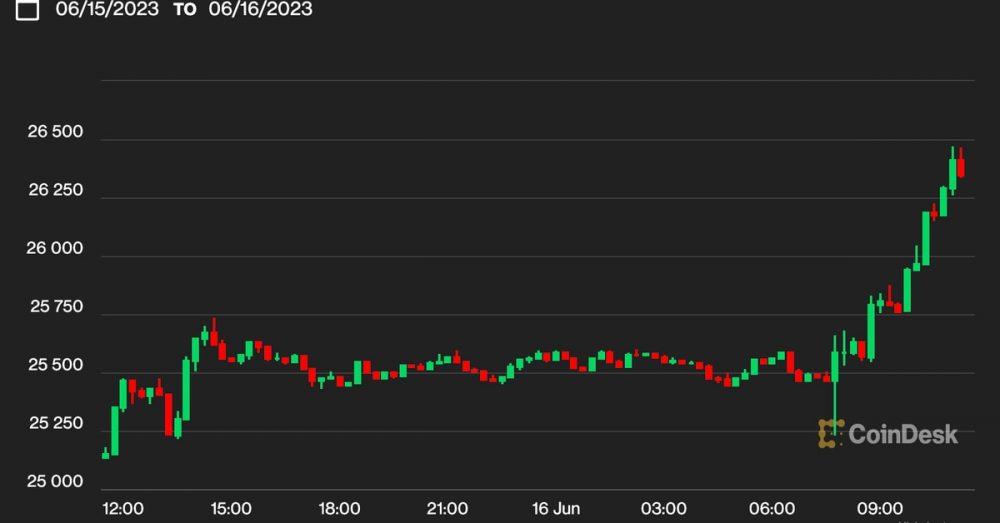Less than 24 hours after fund management giant BlackRock filed paperwork for a spot bitcoin ETF, bitcoin recrossed $26,000 and soared to its highest level in a week.
The largest cryptocurrency by market capitalization was recently trading at $26,369, up nearly 5% over the past 24 hours, according to CoinDesk data. BTC was trading below $25,000 – near its three-month low – as recently as Thursday morning before settling at about $25,500 in the hours immediately following the BlackRock filing.
Ether, the second largest crypto in market value, was recently changing hands at $1,721, up 4.5% from Thursday, same time. Earlier this week, ETH lost the $1,700 threshold for the first time since mid March.
Other major cryptocurrencies, including those that tumbled following their mention in U.S. Securities and Exchange Commission (SEC) lawsuits against exchanges Binance and Coinbase last week, regained large swathes of ground. SOL, the token of the Solana blockchain, was recently up more than 7%. ADA, MATIC and ALGO, the native cryptocurrencies of smart contract platforms Cardano, Polygon and Algorand, rose 3.5%, 3% and 4.1%, respectively.
The CoinDesk Market Index, a measure of the cryptocurrency market’s performance, increased 4.4%, although CoinDesk’s Bitcoin and Ether Trend Indicators remained in downturn territory, reflecting lingering investor worries about an industry being buffeted by increasing U.S. regulatory scrutiny, and inflation and monetary policy concerns.
The main equity indexes were trading sideways after seesawing earlier in the day with the tech-focused Nasdaq Composite up slightly but the S&P 500, which has a hefty technology component, down a smidgen. Stocks have surged six consecutive days with the Nasdaq, S&P 500 and Dow Jones Industrial Average (DJIA) all recently hitting 2023 highs. Gold and U.S. Treasury yields both ticked up.
In a speech Friday, Federal Reserve Governor Christopher Waller indicated that the central bank remained concerned about inflation, even as it has weathered criticism that its hawkishness precipitated a March crisis in the banking sector. Earlier this week, the Fed halted a 14-month diet of rate hikes that have often weighed heavily on crypto and other asset markets.
“The Fed’s job is to use monetary policy to achieve its dual mandate, and right now that means raising rates to fight inflation,” Waller said at an economics conference in Norway. “It is the job of bank leaders to deal with interest rate risk, and nearly all bank leaders have done exactly that. I do not support altering the stance of monetary policy over worries of ineffectual management at a few banks.”







